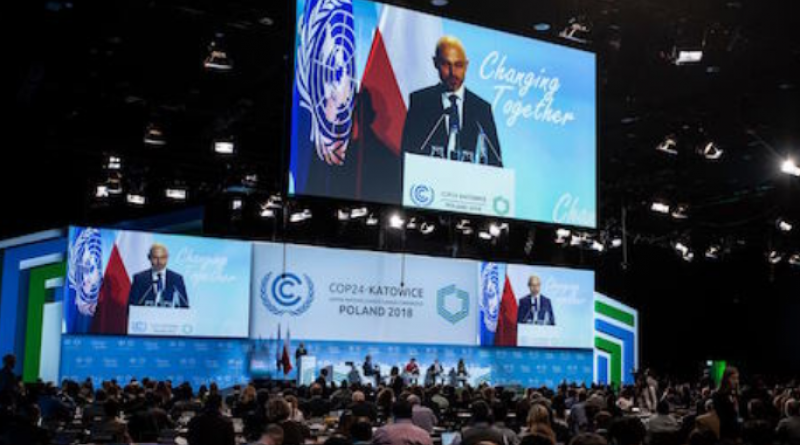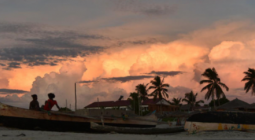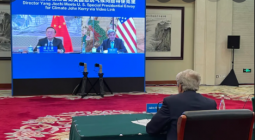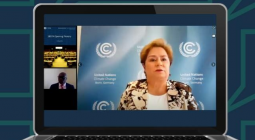BREAKING (The Energy Mix): Postpone COP26 over COVID Safety Failures, Climate Groups Urge

Crucial negotiations over carbon reductions and international climate finance at this year’s United Nations climate change conference must be postponed because of the UK government’s failure to ensure pandemic safety, particularly for delegates from the Global South, Climate Action Network-International declared in a statement released this morning.
“With just two months to go, it is evident that a safe, inclusive and just global climate conference is impossible given the failure to allow vaccines to reach millions of people in poor countries, the rising costs of international travel and accommodation, and the uncertainty in the course of the COVID 19 pandemic,” CAN writes.
The release stresses that the call for a delayed in-person meeting “does not in any way imply a postponement of urgent climate action or a boycott of the climate talks.”
But holding the COP as planned in the first two weeks of November in Glasgow, Scotland, would “de facto exclude” participants from the parts of the world most affected by the climate crisis, CAN adds, with many countries in the Global South currently on the UK’s COVID-19 “red list”. That exclusion “poses serious and long-lasting implications for issues that will be under deliberation at this COP and that are extremely important to developing countries, including on climate finance, loss and damage, and carbon market rules, among others.”
“Our concern is that those countries most deeply affected by the climate crisis and the countries suffering from the artificial shortage created around vaccines will be conspicuous in COP26—by their absence,” said CAN Executive Director Tasneem Essop. “There has always been an inherent power imbalance between rich and poor nations within the UN climate talks and this is now compounded by the health crisis. Looking at the current timeline for COP 26 and the logistical challenges, it is difficult to imagine fair participation from the Global South under safe conditions, and it should therefore be postponed.”
“The UK has been too slow in delivering its vaccines support to delegates in vulnerable countries, and their quarantine requirements come with some eye-watering hotel costs. Some delegates are finding they cannot transit because some of the major travel hubs are closed and the alternative travel costs are beyond the reach of some poorer governments and smaller civil society organizations,” added Power Shift Africa Director Mohamed Adow. “If COP 26 goes ahead as currently planned, I fear it is only the rich countries and NGOs from those countries that would be able to attend.”
The UK’s quarantine rules for red list visitors would require incoming delegates from many of the world’s most destitute and climate-vulnerable countries to spend 10 days in a quarantine hotel, at their own considerable expense, despite warnings that COVID-19 safety in the hotels themselves is far from assured. Delegates from places in the UK’s “amber” and “green” categories will still be subject to “red list” restrictions if their countries’ COVID status shifts after they’ve budgeted and booked their trips, and anyone who tests positive for the virus after arriving in Glasgow must quarantine for 10 days out of a 15-day conference.
All of which makes sense when you’re trying to control a global pandemic, but not if you have any intention of hosting an international climate conference where all voices, including the most vulnerable, are heard and respected.
But the Boris Johnson government in the UK appears to have missed that memo (their attention no doubt diverted by the nifty, new underground coal mine, offshore oilfield, and major airport expansion they’re also intent on approving).
Immediately after the CAN release, COP President Alok Sharma tweeted that the UK will fund quarantine hotels for accredited delegates from red list countries and maintained the country’s vaccine plan would “ensure an inclusive, accessible & COVID-secure summit.” Carlos Rittl, senior fellow at the Institute for Advanced Sustainability Studies in Potsdam, Germany, replied that “COP 26 with equitable conditions for all will not be solved by offering free vaccines and funds for quarantine hotels for delegates from poor nations only. Many gov representatives that should be at COP 26 are now struggling to prevent deaths.”
Yet the organization representing the 45 countries with the highest vulnerability to climate change are saying the show must go on, tweeted Politico Europe reporter Karl Mathiesen. “COP 26 must happen in-person in 2021,” the organization said. “Vulnerable developing countries need special support, facilitated access, and hybrid modalities,” but “this is the most important meeting for the future of the planet and it cannot wait.”
“Further postponement is unnecessary,” Giza Gaspar-Martins, a climate diplomat from Angola, told Mathiesen. “There are important items that need to be sorted. Delegations need not be large and side events can be significantly reduced. The UK must make the necessary adjustments to allow for inclusiveness.”
“Vulnerable countries will suffer most if COP decisions are deferred,” added Carlos Fuller, a climate diplomat from Belize. “The UK is planning for a hybrid event. I think everything is still up in the air. If we cannot meet in person, we should meet virtually and adopt decisions.”
Angola is currently on the UK’s red list, while Belize is on the amber list, Mathiesen writes.
While the focus now is on last-minute vaccinations and logistical arrangements to salvage the conference, the momentum for failure was set at the G7 meeting in June—also organized by the Johnson government—where countries’ commitments to international vaccine distribution fell far short of the identified need. On an all-important matter of humanitarian assistance and solidarity with serious implications for climate action, the world’s richest economies came up with only a billion doses for developing countries that are still in the deepest throes of the pandemic and need as many as 11 billion shots to get new variants under control.
“If the best G7 leaders can manage is to donate one billion vaccine doses then this summit will have been a failure,” Oxfam health policy manager Anna Marriott said at the time.
“What the world needs is vaccines now, not later this year,” agreed Alex Harris, director of government relations at the UK’s Wellcome health charity. “At this historic moment, the G7 must show the political leadership our crisis demands.”
The G7’s failure set up yet another ethical and practical dilemma for delegates from countries with vaccination rates as low as 0.1, 0.3, or 0.5 per 100 population: how can anyone justify vaccine doses for COP delegates while their countries’ front-line health care workers go without?
Now, “it must be noted that purely logistical solutions oriented towards COP 26 participants only are insufficient,” CAN says in a backgrounder to its release. “In order to make any in-person meeting at the scale of a COP possible to be held safely and inclusively in 2022, rich country governments must take urgent steps to provide vaccines at the scale required to deal with the pandemic to poor countries,” including “immediate technology transfer to enable vaccine manufacturing in the Global South.”
Over the last couple of weeks, the UK has insisted it was on track to vaccinate all delegates before the COP is scheduled to open November 1, with doses available beginning next week, Sky News reports. That’s a tight schedule, with all participants needing their first jabs by mid-month to be fully protected by a second dose in time to travel.
“There is a lot of disquiet and concern amongst Global South participants—including delegates—about participation and access generally beyond vaccines, including around quarantining costs and general high costs in Glasgow,” Friends of the Earth International climate justice coordinator Sara Shaw told the UK television network.
Adrian Martinez, director of La Ruta Del Clima in Costa Rica, added that quarantine costs would be “unaffordable for most Latin American NGOs and even some country delegations”. If quarantine is needed, he added, “it should be enforced equally and financial support must be provided. If not, it is a structural barrier that will keep the Global South excluded from the 1.5°C negotiations. This is unjust.”
Less than a week ago, Climate Home News said Global South delegates were getting increasingly frustrated with the UK’s pandemic and vaccination plans, with most campaigners from developing countries saying they’d heard nothing from conference organizers.
“Climate Home News has spoken to climate campaigners in Nigeria, Senegal, Kenya, Pakistan, Argentina, and Nicaragua who don’t know whether they will safely attend the critical event,” the publication reported. “They told Climate Home the situation was stressful and unfair, threatening to limit participation from poorer parts of the world.”
Although the Johnson government keeps promising “the most inclusive COP ever”, a negotiator from the Democratic Republic of Congo—the country with the world’s lowest vaccination rate per 100 population—was picking up the opposite message. “The biggest frustration is the feeling that some are trying to organize the summit without the participation of certain countries, the feeling that the UK government is telling us: ‘don’t come’,” the negotiator told Climate Home.
“Authentic climate solutions exist but what is missing is genuine solidarity,” Greenpeace International Executive Director Jennifer Morgan said in this morning’s CAN release. “Like the pandemic, the climate and biodiversity emergency knows no boundaries or nationalities, but it is those least responsible who are the worst impacted. Equity, safety, action, and accountability—all of the ingredients for solidarity—must be central to COP 26 being the success it has to be. This can only be achieved through timely vaccine access and financial support for quarantine expenses,” yet “these elements are all lacking.”
7 September 2021
The Energy Mix




